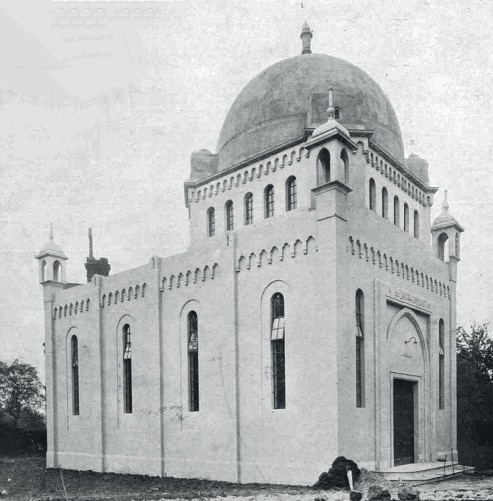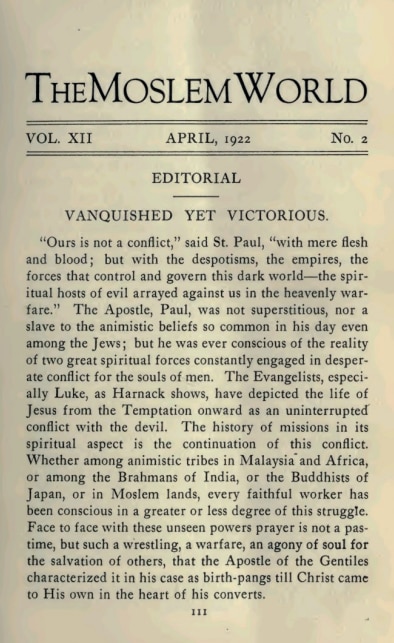
On the occasion of Eid-ul-Adha (14 August 1921), Maulvi Mubarak Ali Sahib BA delivered a sermon in London that was published in the October 1921 issue of The Review of Religions. This entire sermon was transcribed and reproduced in the 15 October 2021 issue of Al Hakam (p. 15) under the “100 Years Ago…” section, titled “Eid-ul-Adha sermon (1921) by Maulvi Mubarik Ali Sahib in London”.
The Moslem World, an Anglo-American journal on Islam, at that time published some extracts of the above-mentioned sermon in its issue of April 1922 under the title “A Sermon on Sacrifice” and suggested that “the New Islam”, i.e. Ahmadiyyat, had somehow compromised Islam. The aforesaid article is as follows:
“A Sermon on Sacrifice
“(Given at the Moslem Festival in London)
“The following are extracts from a sermon delivered at the Annual Moslem Festival held on the 14th August [1921] in London. After the customary prayers in the open air, Maulvi Mubarik Ali, BA, spoke in English:
“‘Ladies and Gentlemen — We are celebrating today in this fatherland of free nations the greatest of the Islamic festivals, Idul-Azha. It is on this occasion that the great pilgrimage to Mecca is performed. Muslims from the four corners of the world assemble in the Holy City of Mecca as brethren, each clothed in a simple white robe, and bow down their heads in the service of their Great Maker and the festivity being similarly celebrated in the other parts of the Islamic world at the same time, manifests the fundamental unity of the brotherhood of Islam – a brotherhood which wipes out all distinctions of rank, race and colour, and is not to be found in other religions of the world.
“‘This festival has a touching history well-known to the followers of the three great Semitic religions i.e., Judaism, Christianity and Islam. Briefly stated the Muslim version is this: Abraham, the father of the prophets, saw in a vision that under the command of his Lord he was to sacrifice his son Ishmael. He told Ishmael this dream and asked him what he thought of it. Ishmael who was ever ready to give everything for the sake of God, replied, “Father, do what you are commanded to do and you will find me obedient.” This dream was fulfilled and the sacrifice of Ishmael accomplished when Abraham left his wife Hagar and her son Ishmael in a solitary, dry, and sultry piece of land between the two hills of Safa and Marwa near which stands today the Holy City of Mecca.
“‘The story runs that when the little provisions and water left with them by Abraham were exhausted, Ishmael, the little child, began to cry for water. His mother ran first to the one hill and then to the other for water but found no trace of it. It is said that she ran seven times between the two hills. When she at last returned to the child in despair, she found him stamping on the ground with his little feet, and a spring of clear water gushing forth from underneath them.
“‘Tradition thus declares the origin of the famous well of Zemzem near the Kaaba, the Holy Temple of Mecca. In course of time this solitary place became a pilgrimage of the children of Ishmael, a centre of trade and a flourishing city.’
“Interpreting this Moslem legend, the speaker distinguished between sacrifice in the Jewish faith, among Christians and according to Islam as follows:
“‘The Islamic idea of sacrifice, i.e., the sacrifice of the lower for the higher, is a grand truth implanted in the nature of man, and we find it illustrated in everyday life, and in every sphere of human activity. So this sacrifice can be easily distinguished from other kinds of sacrifice to appease an offended deity or to make an atonement for sins. A deity which is offended without a just cause and demands a sacrifice to grant immunity from punishment is not worthy of adoration; and as regards the doctrine of atonement even if we grant that this doctrine could avail humanity anything it would be more in keeping with natural experience that the lower should be sacrificed for the higher, and not the higher for the lower as is taught in some other religious systems. Thus, the Islamic idea of sacrifice is quite natural and consciously or unconsciously individuals and nations recognise it.’
“‘I have already said that the principle of sacrifice is the central idea in Islam. Prophet Muhammad, peace and blessings of God be upon him, not only preached it but practiced it throughout his life, and fired his followers with it. The early Moslems were embodiments of this spirit, and so they became “a nation of heroes” as an English writer justly says. Here I have used the word “hero” in the highest sense of the word. Because they were such heroes that they became the foremost people in the world in such a short space of time as has no parallel in the history of the world, and remained the foremost people for hundreds of years as long as they were true to this principle. They fell from their high pedestal not because they followed Islam but because they neglected it.’
“The rest of the sermon dealt with reasons for the present decline of Islam. The only hope is the Ahmadiyah sect.
“The closing sentences of the sermon show to what length of compromise the New Islam goes in its efforts at propagandism:
“‘What is wanted is divine rain from heaven – i.e., new revelation, in order that the dryness of heart may be removed by the fresh water of faith. In different ages God sent Abraham, Jesus, Krishna and Buddha for the regeneration of faith. The religious idea found expression through them and in a latter age found its highest expression through Muhammad, peace be on him. The modern world is dying for a saviour, but a saviour has come who has confirmed the truth of Islam and the truth of all the prophets of all the nations. The seed of Islam re-sown by him has already grown into a tree, has spread over the land of Hindustan and has sent out branches to other parts of the world. This mission is one of its branches. Will England sacrifice her pride and prejudice, see and understand, and rise to the height of the occasion? Her children, in an earlier age made great sacrifice for truth. Will they be wanting now?’” (The Moslem World, April 1922, pp. 198-200)

A plain and simple answer to the allegation of “compromise” made in the above article is that Ahmadiyyat has never compromised Islam since its foundation and never will till the end of times. The Review of Religions in its issue of June, July & August 1922 also responded to the aforesaid article and wrote:
“Compromise
“Under the heading of ‘Current Topics’, The Moslem World [journal] for April [1922] gives a few extracts from the ‘Sermon on Sacrifice’ published in our issue [of The Review of Religions] of the last October [1921]. As a missionary journal it was but natural that it should have some outlet for the […] spirit that rages fiercely in the heart of a Christian Missionary. The closing sentences of the said sermon in its opinion ‘show to what length the spirit of compromise is permeating the New Islam in its effort at propagandism.’
“We do not know what it means by the ‘New Islam’. If the editor is referring to the Ahmadiyya movement, we beg to assure him that our creed and our beliefs, our practices and our professions are in strict accordance with the Islam that was given more than 1300 years ago through Holy Prophet[sa] of Arabia. Very probably our opening up centres of Moslem propagation in Christian countries has earned for us the new designation.
“Nevertheless, we deem it expedient to quote in full the closing sentences of the same sermon from the extract published in The Moslem World to show what compromise has really been affected. They are:
“‘What is wanted is divine rain from heaven – i.e., new revelation, in order that the dryness of heart may be removed by the fresh water of faith. In different ages God sent Abraham, Jesus, Krishna and Buddha for the regeneration of faith. The religious idea found expression through them and in a latter age found its highest expression through Muhammad, peace be on him. The modern world is dying for a saviour, but a saviour has come who has confirmed the truth of Islam and the truth of all the prophets of all the nations. The seed of Islam re-sown by him has already grown into a tree, has spread over the land of Hindustan and has sent out branches to other parts of the world. This mission is one of its branches. Will England sacrifice her pride and prejudice, see and understand, and rise to the height of the occasion? Her children, in an earlier age made great sacrifice for truth. Will they be wanting now?’
“We fail to see here the spirit of compromise which is attributed to us but which has indeed been the distinguishing feature of Christianity all down the last 1700 years completely transforming the original and simple monotheistic creed of Jesus into the pagan beliefs of trinitarianism, incarnation and atonement.
That the revelation is likened to the rain water which descends at the time of drought is a purely Quranic teaching, and that Abraham, Moses, Jesus, etc., have been the spiritual regenerators who were divinely called to reform the spiritually dead people is also a Quranic teaching, that such has ever been the divine way is also a purely Quranic teaching, and that this spirit of reformation and regeneration found its highest expression in Muhammad[sa] is also a pure Quranic teaching and that a great reformer was raised in the last days is not only a Quranic and Islamic teaching but it is a belief shared by almost all the religions of the world. Is it then a compromise to say that the expected and promised reformer, the Prophet of the latter days, appeared in the person of Mirza Ghulam Ahmad[as] of Qadian? What compromise can such a claim and a belief in such a claim imply we are at a loss to make out.
“Very probably the reverend gentleman unable to explain the compromised nature of Christianity cleared his own conscience by transferring the charge to Islam to give one more illustration of the way how atonement works in this world. Fortunately for Islam there has been no Paul to give it a tone of compromise.
“The un-compromising nature of Islam may be judged from the following verses taken from chapter Pen [Surah al-Qalam] the underlying spirit of which has ever been bedrock of Islamic principles:
‘They (the unbelievers) desire thee to relent towards them that they relent towards thee, (i.e., a spirit of mutual compromise in matters of faith). But yield not to the man of oaths, a despicable person, defamer, going about with slander, hinderer of the good, transgressor, criminal, harsh – besides this, impure by birth, though a man of riches and blessed with sons.’ [Surah al-Qalam, Ch.68: V.10-16]
“Stronger words of condemnation could hardly be found elsewhere. Islam and compromise, especially in matters of faith, are inconceivable. Therefore we ask our contemporary to enlighten us on the point whether Islam or Christianity has been the religion of compromise.” (The Review of Religions, June, July & August 1922, pp. 284-286)

